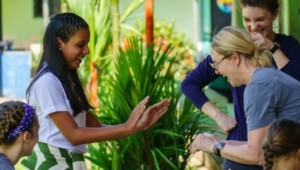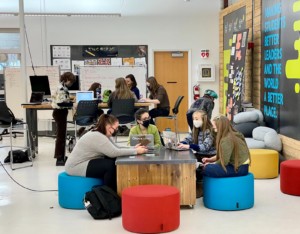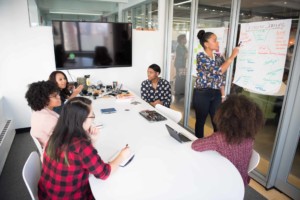A New Normal Summit
This one was different; the “new normal” Summit had more tech, more digital learning, more focus on productivity, and more people. New Schools Venture Fund teamed up with Aspen Institute but stayed close to home with an SFO hotel Summit.
Equal parts TFA alum, Philanthropy Roundtable, Charter Alliance, Techcrunch, and policy advocates, the Summit represents and refreshes the U.S. education improvement agenda.
We don’t have many rock stars in education, but most of them were on the stage at the Summit. Ted Mitchell kicked off the day interviewing Joel Klein and Sal Khan. John Doer, a partner at Kleiner Perkins, interviewed Marc Zuckerberg about his grant to Newark.
Reed Hastings, Netflix CEO and former California state board chair, shared the closing stage with Kaya Henderson, Washington DC chancellor. Reed made the case that edreform is treating symptoms, but the real problem is politically elected leadership. Oscillating political leadership in the nation’s urban centers has wiped out promising reform agendas in San Diego, Sacramento, Seattle, Houston, and other cities. Reed makes the case that it takes decades to achieve excellence and that requires perpetual governance—a board recruited to support a mission. Hastings said that if Kaya built a nonprofit school network, it could last 100 years but her impact leading a district won’t be sustained. On that basis, Reed would like to see all schools operated by nonprofit boards and cities supported by a portfolio of multiple operators.
Chancellor Henderson was surprisingly radical; she has a well-developed vision of personal digital learning. Other than Klein in his last two years, I haven’t heard an urban leader so passionately describe the transformational potential of digital learning.
The Summit felt relevant and productive. It was a well developed agenda, but hallways conversations are always the Summit highlight.
Before this time next year
Some of us interested in improving American public education mark our calendars by the (just concluded) New School Venture Fund Summit. For a dozen years, these gatherings have been a pretty good representation of convention reform wisdom in America. To the basic formula of high standards, measurement and accountability, public school choice, and teacher effectiveness, there was evidence at this week’s summit of increased interest in innovations that boost achievement and sustainability.
Before the next summit, I’d like to see:
1. The two big assessment consortia launch Core-aligned ecosystems (frameworks, platforms, items, and tools) rather than buying slightly better tests.
2. An ESEA that doesn’t completely give up on the good school promise—that every American kid deserves a good school.
3. A dozen states adopt the 10 Elements of High Quality Digital Learning
4. Progress on alternative strategies for certifying learning. How about a prize for new and better ways for kids to show what they know?
At the next summit, I’d like to see:
1. More lessons from folks working, as Ted Kolderie would say, in the bypass lane, or as Clay Christensen would say, around the edges.
2. More lessons from informal learning and more infidels like Sal Khan and Bing Gordon. How about a feature on how the military engineers rapid pathways to mastery for 1.5 million active duty personnel?
3. More spreadsheets with real examples of new and more productive staffing patterns enabled with online learning.
4. A review of state reform context and conversation with the Chiefs for Change






0 Comments
Leave a Comment
Your email address will not be published. All fields are required.